ICT's Influence on Marketing and Operations in the Hotel Sector
VerifiedAdded on 2022/09/03
|20
|4321
|14
Report
AI Summary
This report investigates the significant impact of Information and Communication Technology (ICT) on the hotel sector, focusing on its influence on marketing strategies and operational efficiency. The study explores the various forms of ICT, including the internet, telephone, radio, and television, and their applications within the hospitality industry. It examines how ICT enhances customer relationship management (CRM), property management systems (PMS), electronic point of sale systems (EPOS), and e-marketing efforts. The report also provides case studies of leading hotel chains like Marriott, Hilton, and Hyatt, highlighting their use of ICT. Furthermore, it discusses potential problems associated with ICT implementation and offers recommendations for maximizing its benefits. The report concludes by emphasizing the transformative role of ICT in the hotel sector, driving innovation and improving guest experiences.
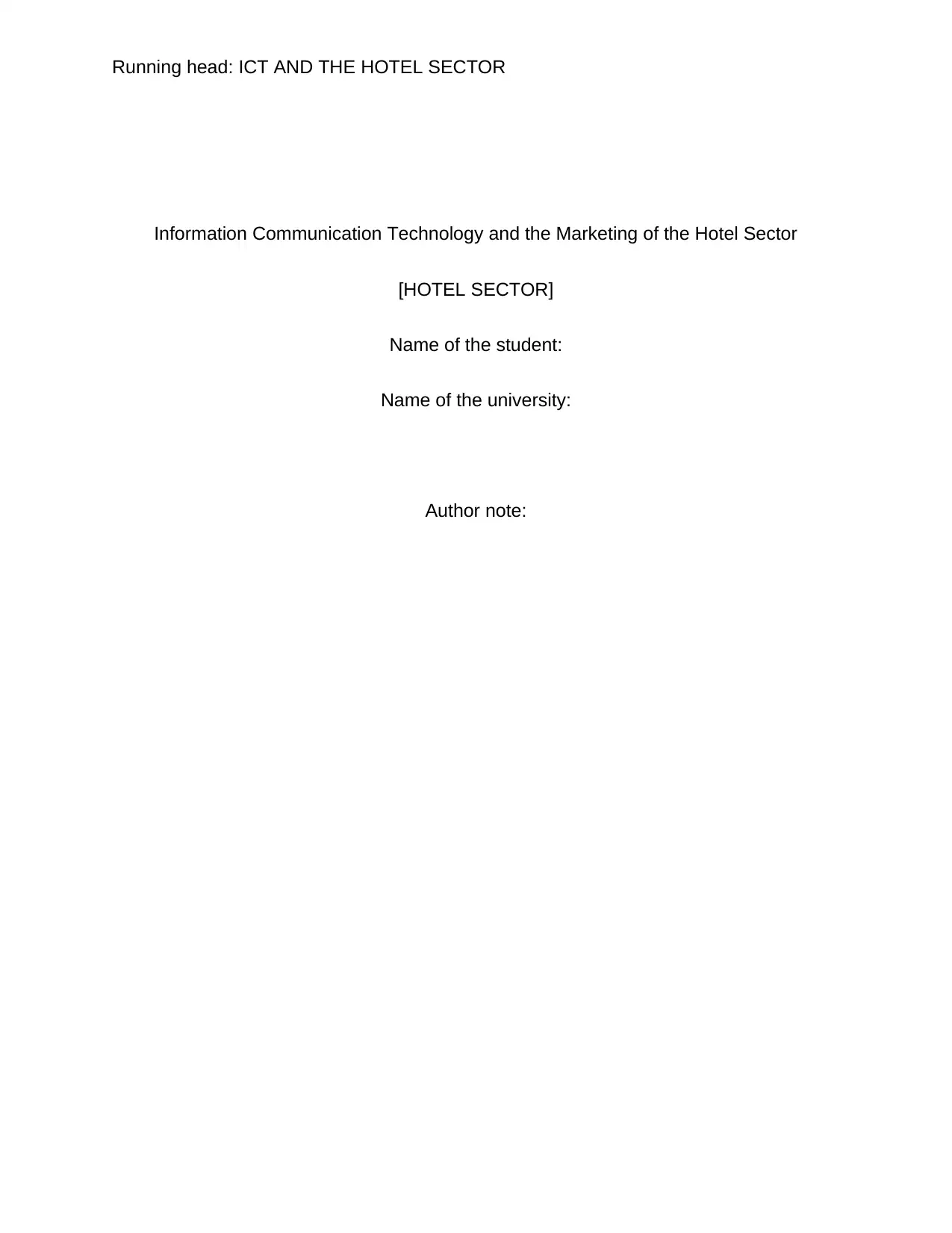
Running head: ICT AND THE HOTEL SECTOR
Information Communication Technology and the Marketing of the Hotel Sector
[HOTEL SECTOR]
Name of the student:
Name of the university:
Author note:
Information Communication Technology and the Marketing of the Hotel Sector
[HOTEL SECTOR]
Name of the student:
Name of the university:
Author note:
Paraphrase This Document
Need a fresh take? Get an instant paraphrase of this document with our AI Paraphraser
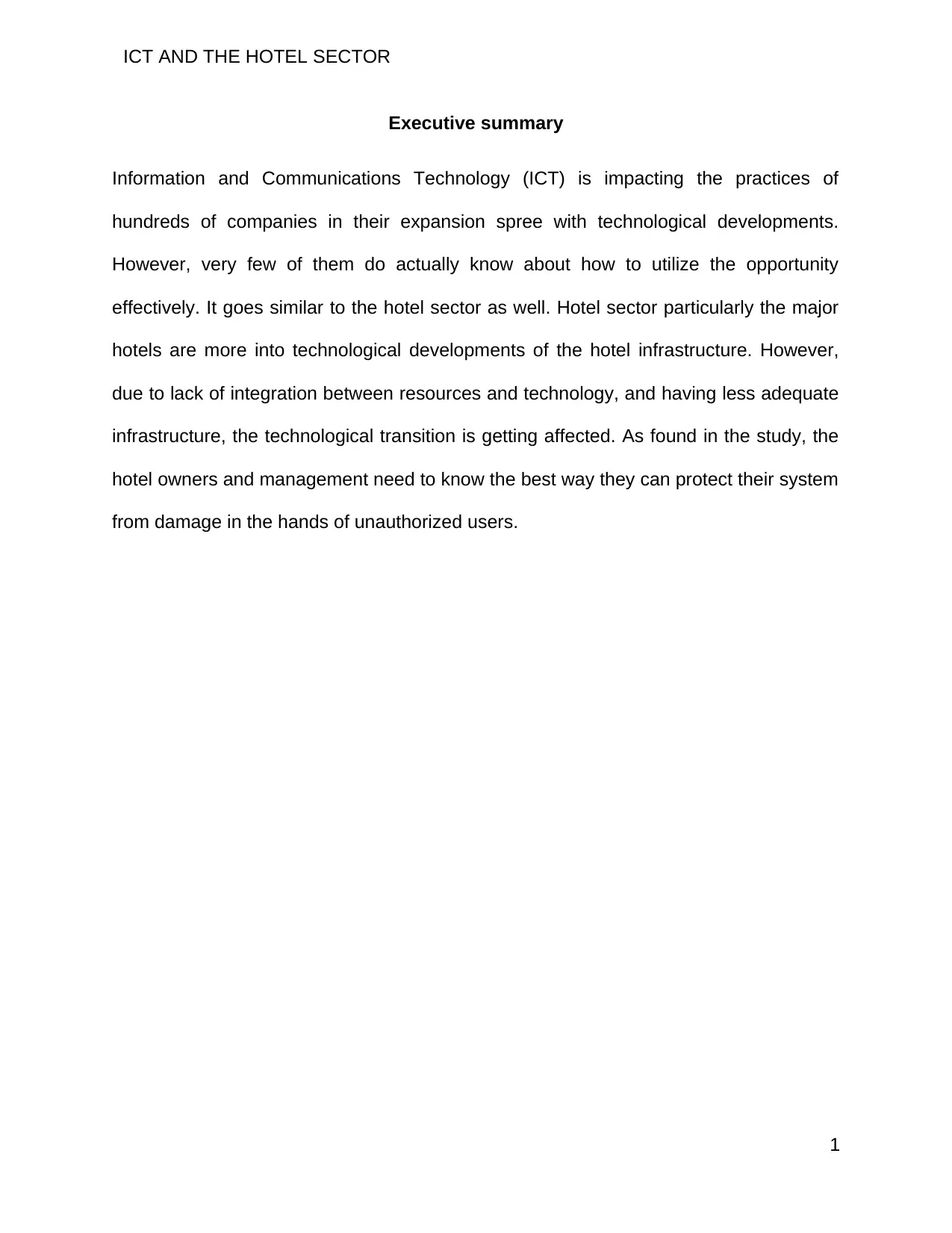
ICT AND THE HOTEL SECTOR
Executive summary
Information and Communications Technology (ICT) is impacting the practices of
hundreds of companies in their expansion spree with technological developments.
However, very few of them do actually know about how to utilize the opportunity
effectively. It goes similar to the hotel sector as well. Hotel sector particularly the major
hotels are more into technological developments of the hotel infrastructure. However,
due to lack of integration between resources and technology, and having less adequate
infrastructure, the technological transition is getting affected. As found in the study, the
hotel owners and management need to know the best way they can protect their system
from damage in the hands of unauthorized users.
1
Executive summary
Information and Communications Technology (ICT) is impacting the practices of
hundreds of companies in their expansion spree with technological developments.
However, very few of them do actually know about how to utilize the opportunity
effectively. It goes similar to the hotel sector as well. Hotel sector particularly the major
hotels are more into technological developments of the hotel infrastructure. However,
due to lack of integration between resources and technology, and having less adequate
infrastructure, the technological transition is getting affected. As found in the study, the
hotel owners and management need to know the best way they can protect their system
from damage in the hands of unauthorized users.
1
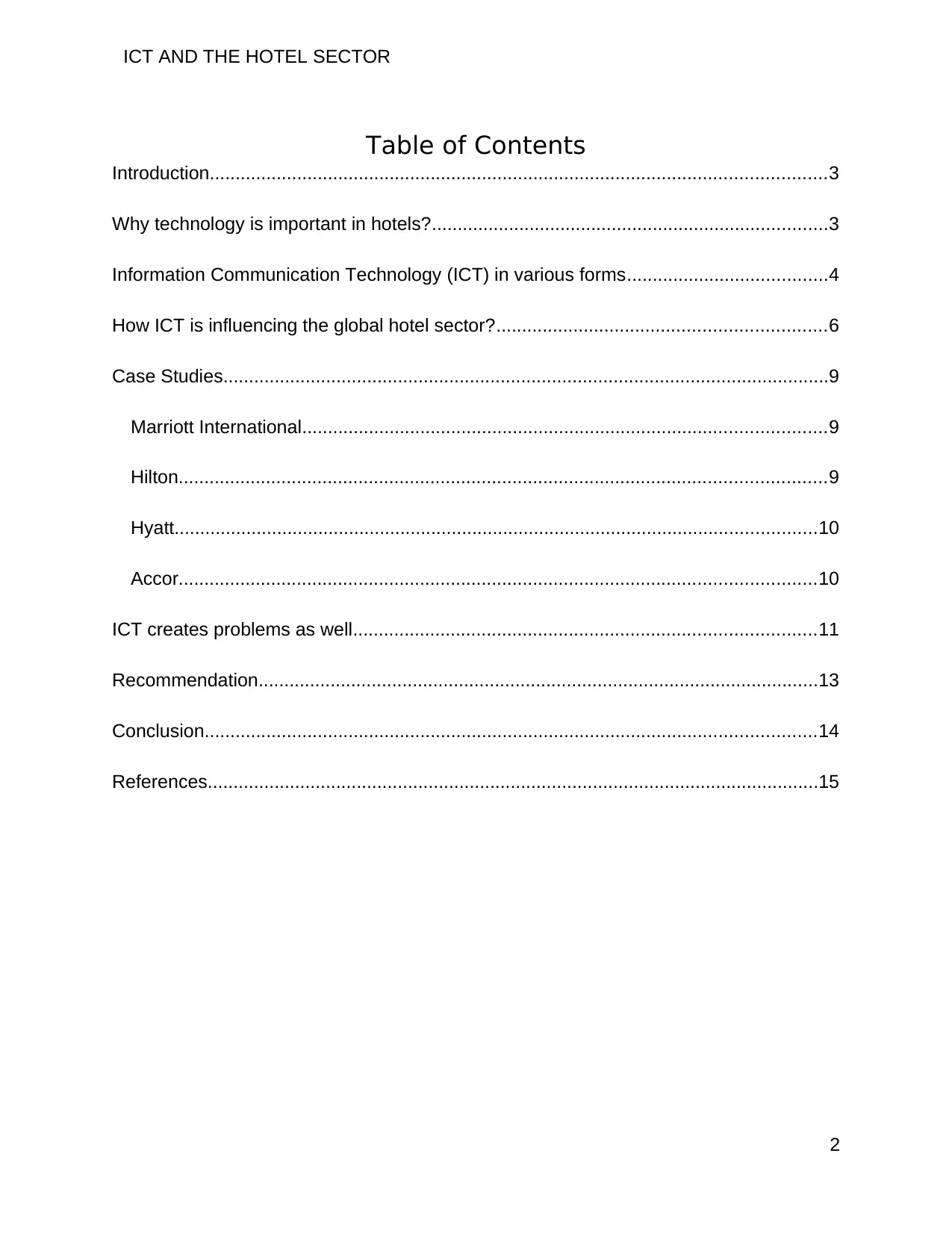
ICT AND THE HOTEL SECTOR
Table of Contents
Introduction........................................................................................................................3
Why technology is important in hotels?.............................................................................3
Information Communication Technology (ICT) in various forms.......................................4
How ICT is influencing the global hotel sector?................................................................6
Case Studies......................................................................................................................9
Marriott International......................................................................................................9
Hilton..............................................................................................................................9
Hyatt.............................................................................................................................10
Accor............................................................................................................................10
ICT creates problems as well..........................................................................................11
Recommendation.............................................................................................................13
Conclusion.......................................................................................................................14
References.......................................................................................................................15
2
Table of Contents
Introduction........................................................................................................................3
Why technology is important in hotels?.............................................................................3
Information Communication Technology (ICT) in various forms.......................................4
How ICT is influencing the global hotel sector?................................................................6
Case Studies......................................................................................................................9
Marriott International......................................................................................................9
Hilton..............................................................................................................................9
Hyatt.............................................................................................................................10
Accor............................................................................................................................10
ICT creates problems as well..........................................................................................11
Recommendation.............................................................................................................13
Conclusion.......................................................................................................................14
References.......................................................................................................................15
2
⊘ This is a preview!⊘
Do you want full access?
Subscribe today to unlock all pages.

Trusted by 1+ million students worldwide
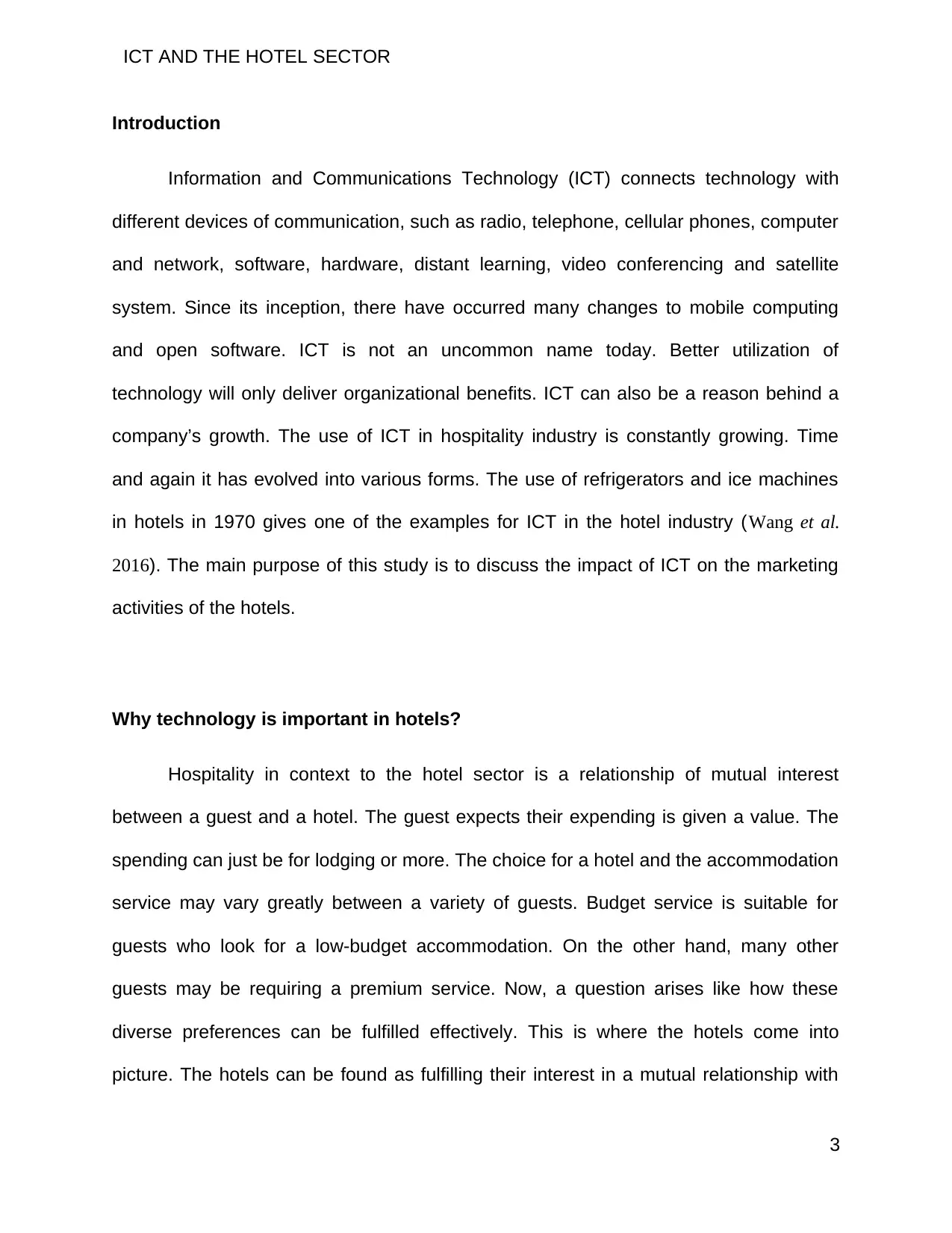
ICT AND THE HOTEL SECTOR
Introduction
Information and Communications Technology (ICT) connects technology with
different devices of communication, such as radio, telephone, cellular phones, computer
and network, software, hardware, distant learning, video conferencing and satellite
system. Since its inception, there have occurred many changes to mobile computing
and open software. ICT is not an uncommon name today. Better utilization of
technology will only deliver organizational benefits. ICT can also be a reason behind a
company’s growth. The use of ICT in hospitality industry is constantly growing. Time
and again it has evolved into various forms. The use of refrigerators and ice machines
in hotels in 1970 gives one of the examples for ICT in the hotel industry (Wang et al.
2016). The main purpose of this study is to discuss the impact of ICT on the marketing
activities of the hotels.
Why technology is important in hotels?
Hospitality in context to the hotel sector is a relationship of mutual interest
between a guest and a hotel. The guest expects their expending is given a value. The
spending can just be for lodging or more. The choice for a hotel and the accommodation
service may vary greatly between a variety of guests. Budget service is suitable for
guests who look for a low-budget accommodation. On the other hand, many other
guests may be requiring a premium service. Now, a question arises like how these
diverse preferences can be fulfilled effectively. This is where the hotels come into
picture. The hotels can be found as fulfilling their interest in a mutual relationship with
3
Introduction
Information and Communications Technology (ICT) connects technology with
different devices of communication, such as radio, telephone, cellular phones, computer
and network, software, hardware, distant learning, video conferencing and satellite
system. Since its inception, there have occurred many changes to mobile computing
and open software. ICT is not an uncommon name today. Better utilization of
technology will only deliver organizational benefits. ICT can also be a reason behind a
company’s growth. The use of ICT in hospitality industry is constantly growing. Time
and again it has evolved into various forms. The use of refrigerators and ice machines
in hotels in 1970 gives one of the examples for ICT in the hotel industry (Wang et al.
2016). The main purpose of this study is to discuss the impact of ICT on the marketing
activities of the hotels.
Why technology is important in hotels?
Hospitality in context to the hotel sector is a relationship of mutual interest
between a guest and a hotel. The guest expects their expending is given a value. The
spending can just be for lodging or more. The choice for a hotel and the accommodation
service may vary greatly between a variety of guests. Budget service is suitable for
guests who look for a low-budget accommodation. On the other hand, many other
guests may be requiring a premium service. Now, a question arises like how these
diverse preferences can be fulfilled effectively. This is where the hotels come into
picture. The hotels can be found as fulfilling their interest in a mutual relationship with
3
Paraphrase This Document
Need a fresh take? Get an instant paraphrase of this document with our AI Paraphraser
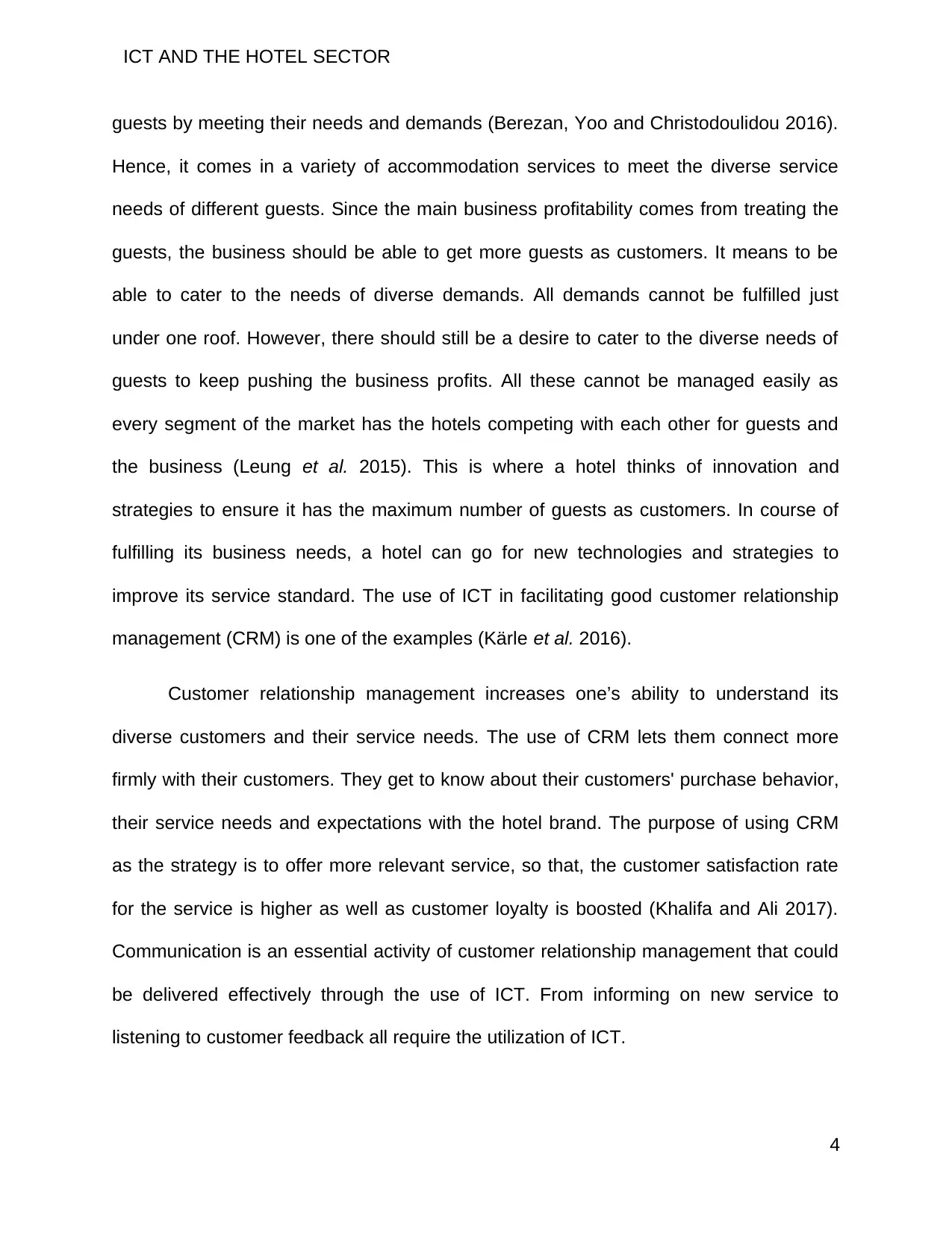
ICT AND THE HOTEL SECTOR
guests by meeting their needs and demands (Berezan, Yoo and Christodoulidou 2016).
Hence, it comes in a variety of accommodation services to meet the diverse service
needs of different guests. Since the main business profitability comes from treating the
guests, the business should be able to get more guests as customers. It means to be
able to cater to the needs of diverse demands. All demands cannot be fulfilled just
under one roof. However, there should still be a desire to cater to the diverse needs of
guests to keep pushing the business profits. All these cannot be managed easily as
every segment of the market has the hotels competing with each other for guests and
the business (Leung et al. 2015). This is where a hotel thinks of innovation and
strategies to ensure it has the maximum number of guests as customers. In course of
fulfilling its business needs, a hotel can go for new technologies and strategies to
improve its service standard. The use of ICT in facilitating good customer relationship
management (CRM) is one of the examples (Kärle et al. 2016).
Customer relationship management increases one’s ability to understand its
diverse customers and their service needs. The use of CRM lets them connect more
firmly with their customers. They get to know about their customers' purchase behavior,
their service needs and expectations with the hotel brand. The purpose of using CRM
as the strategy is to offer more relevant service, so that, the customer satisfaction rate
for the service is higher as well as customer loyalty is boosted (Khalifa and Ali 2017).
Communication is an essential activity of customer relationship management that could
be delivered effectively through the use of ICT. From informing on new service to
listening to customer feedback all require the utilization of ICT.
4
guests by meeting their needs and demands (Berezan, Yoo and Christodoulidou 2016).
Hence, it comes in a variety of accommodation services to meet the diverse service
needs of different guests. Since the main business profitability comes from treating the
guests, the business should be able to get more guests as customers. It means to be
able to cater to the needs of diverse demands. All demands cannot be fulfilled just
under one roof. However, there should still be a desire to cater to the diverse needs of
guests to keep pushing the business profits. All these cannot be managed easily as
every segment of the market has the hotels competing with each other for guests and
the business (Leung et al. 2015). This is where a hotel thinks of innovation and
strategies to ensure it has the maximum number of guests as customers. In course of
fulfilling its business needs, a hotel can go for new technologies and strategies to
improve its service standard. The use of ICT in facilitating good customer relationship
management (CRM) is one of the examples (Kärle et al. 2016).
Customer relationship management increases one’s ability to understand its
diverse customers and their service needs. The use of CRM lets them connect more
firmly with their customers. They get to know about their customers' purchase behavior,
their service needs and expectations with the hotel brand. The purpose of using CRM
as the strategy is to offer more relevant service, so that, the customer satisfaction rate
for the service is higher as well as customer loyalty is boosted (Khalifa and Ali 2017).
Communication is an essential activity of customer relationship management that could
be delivered effectively through the use of ICT. From informing on new service to
listening to customer feedback all require the utilization of ICT.
4
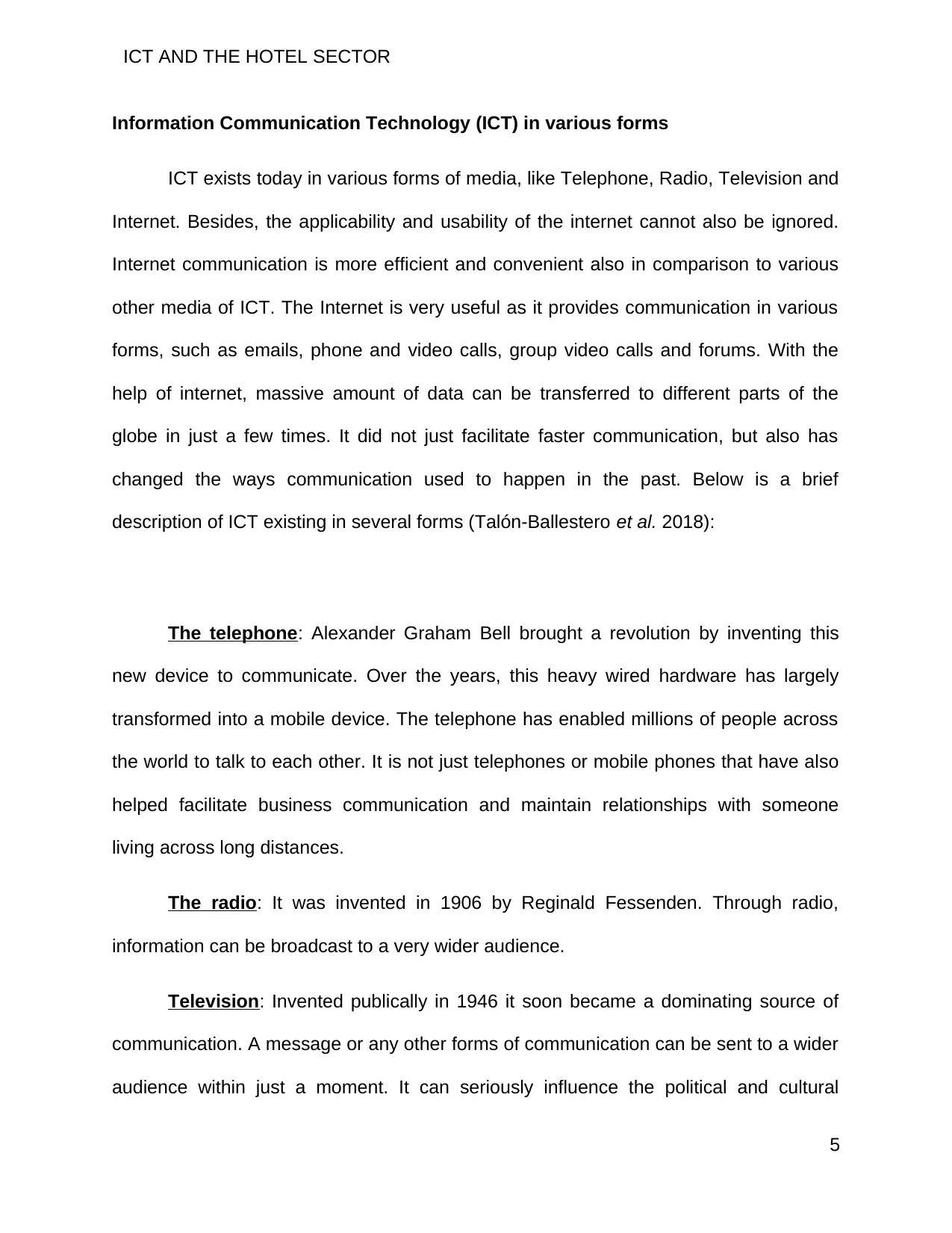
ICT AND THE HOTEL SECTOR
Information Communication Technology (ICT) in various forms
ICT exists today in various forms of media, like Telephone, Radio, Television and
Internet. Besides, the applicability and usability of the internet cannot also be ignored.
Internet communication is more efficient and convenient also in comparison to various
other media of ICT. The Internet is very useful as it provides communication in various
forms, such as emails, phone and video calls, group video calls and forums. With the
help of internet, massive amount of data can be transferred to different parts of the
globe in just a few times. It did not just facilitate faster communication, but also has
changed the ways communication used to happen in the past. Below is a brief
description of ICT existing in several forms (Talón-Ballestero et al. 2018):
The telephone: Alexander Graham Bell brought a revolution by inventing this
new device to communicate. Over the years, this heavy wired hardware has largely
transformed into a mobile device. The telephone has enabled millions of people across
the world to talk to each other. It is not just telephones or mobile phones that have also
helped facilitate business communication and maintain relationships with someone
living across long distances.
The radio: It was invented in 1906 by Reginald Fessenden. Through radio,
information can be broadcast to a very wider audience.
Television: Invented publically in 1946 it soon became a dominating source of
communication. A message or any other forms of communication can be sent to a wider
audience within just a moment. It can seriously influence the political and cultural
5
Information Communication Technology (ICT) in various forms
ICT exists today in various forms of media, like Telephone, Radio, Television and
Internet. Besides, the applicability and usability of the internet cannot also be ignored.
Internet communication is more efficient and convenient also in comparison to various
other media of ICT. The Internet is very useful as it provides communication in various
forms, such as emails, phone and video calls, group video calls and forums. With the
help of internet, massive amount of data can be transferred to different parts of the
globe in just a few times. It did not just facilitate faster communication, but also has
changed the ways communication used to happen in the past. Below is a brief
description of ICT existing in several forms (Talón-Ballestero et al. 2018):
The telephone: Alexander Graham Bell brought a revolution by inventing this
new device to communicate. Over the years, this heavy wired hardware has largely
transformed into a mobile device. The telephone has enabled millions of people across
the world to talk to each other. It is not just telephones or mobile phones that have also
helped facilitate business communication and maintain relationships with someone
living across long distances.
The radio: It was invented in 1906 by Reginald Fessenden. Through radio,
information can be broadcast to a very wider audience.
Television: Invented publically in 1946 it soon became a dominating source of
communication. A message or any other forms of communication can be sent to a wider
audience within just a moment. It can seriously influence the political and cultural
5
⊘ This is a preview!⊘
Do you want full access?
Subscribe today to unlock all pages.

Trusted by 1+ million students worldwide
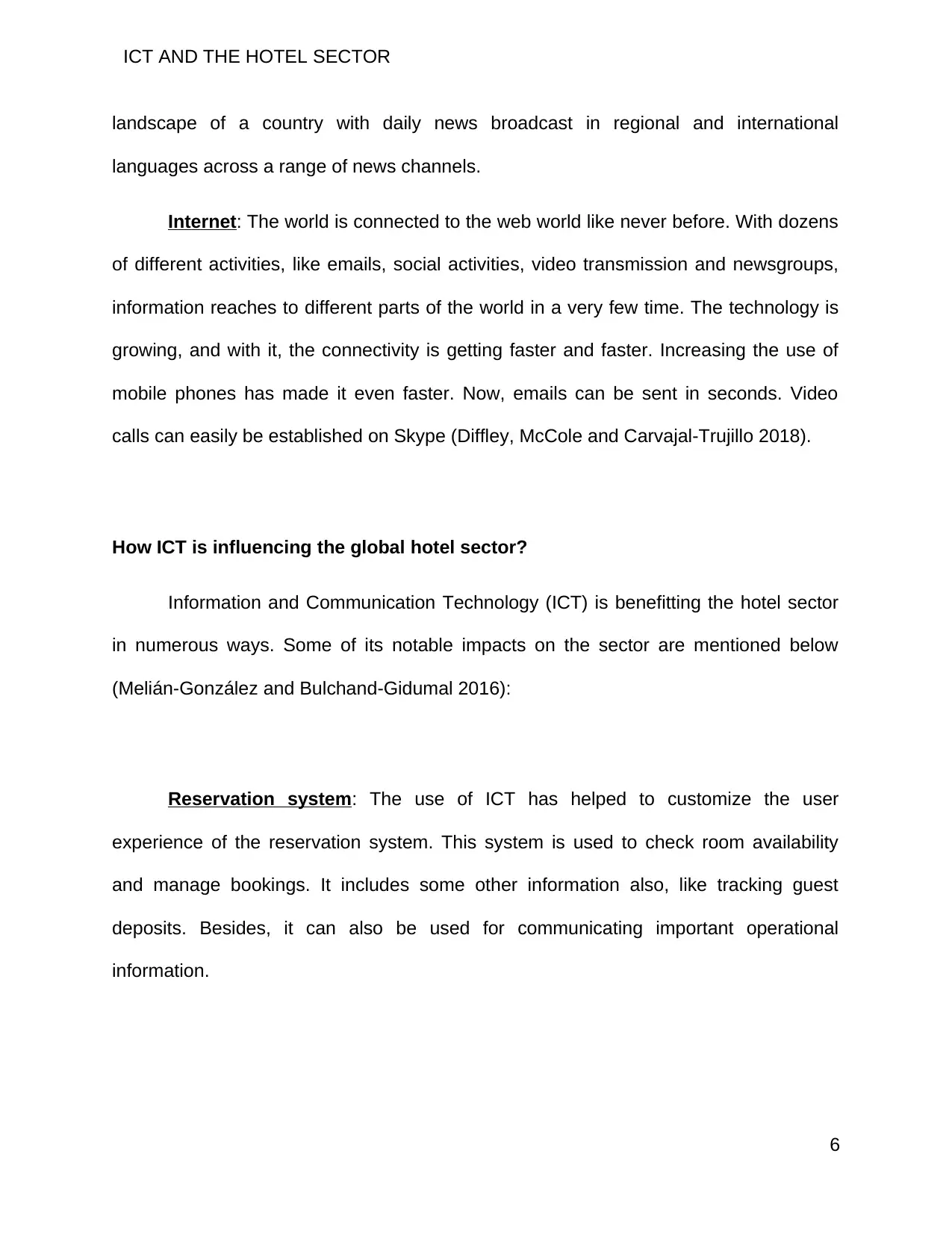
ICT AND THE HOTEL SECTOR
landscape of a country with daily news broadcast in regional and international
languages across a range of news channels.
Internet: The world is connected to the web world like never before. With dozens
of different activities, like emails, social activities, video transmission and newsgroups,
information reaches to different parts of the world in a very few time. The technology is
growing, and with it, the connectivity is getting faster and faster. Increasing the use of
mobile phones has made it even faster. Now, emails can be sent in seconds. Video
calls can easily be established on Skype (Diffley, McCole and Carvajal-Trujillo 2018).
How ICT is influencing the global hotel sector?
Information and Communication Technology (ICT) is benefitting the hotel sector
in numerous ways. Some of its notable impacts on the sector are mentioned below
(Melián-González and Bulchand-Gidumal 2016):
Reservation system: The use of ICT has helped to customize the user
experience of the reservation system. This system is used to check room availability
and manage bookings. It includes some other information also, like tracking guest
deposits. Besides, it can also be used for communicating important operational
information.
6
landscape of a country with daily news broadcast in regional and international
languages across a range of news channels.
Internet: The world is connected to the web world like never before. With dozens
of different activities, like emails, social activities, video transmission and newsgroups,
information reaches to different parts of the world in a very few time. The technology is
growing, and with it, the connectivity is getting faster and faster. Increasing the use of
mobile phones has made it even faster. Now, emails can be sent in seconds. Video
calls can easily be established on Skype (Diffley, McCole and Carvajal-Trujillo 2018).
How ICT is influencing the global hotel sector?
Information and Communication Technology (ICT) is benefitting the hotel sector
in numerous ways. Some of its notable impacts on the sector are mentioned below
(Melián-González and Bulchand-Gidumal 2016):
Reservation system: The use of ICT has helped to customize the user
experience of the reservation system. This system is used to check room availability
and manage bookings. It includes some other information also, like tracking guest
deposits. Besides, it can also be used for communicating important operational
information.
6
Paraphrase This Document
Need a fresh take? Get an instant paraphrase of this document with our AI Paraphraser
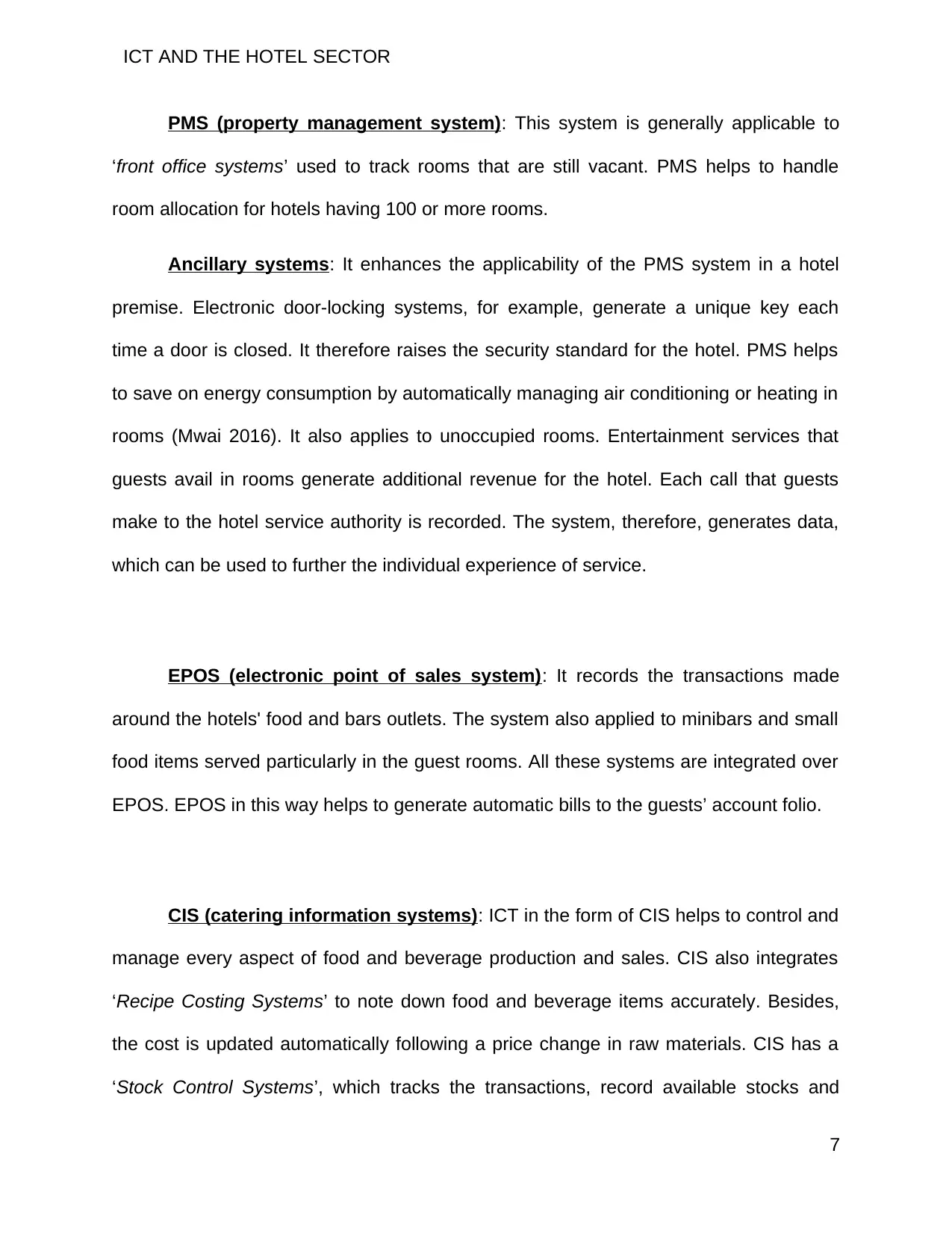
ICT AND THE HOTEL SECTOR
PMS (property management system): This system is generally applicable to
‘front office systems’ used to track rooms that are still vacant. PMS helps to handle
room allocation for hotels having 100 or more rooms.
Ancillary systems: It enhances the applicability of the PMS system in a hotel
premise. Electronic door-locking systems, for example, generate a unique key each
time a door is closed. It therefore raises the security standard for the hotel. PMS helps
to save on energy consumption by automatically managing air conditioning or heating in
rooms (Mwai 2016). It also applies to unoccupied rooms. Entertainment services that
guests avail in rooms generate additional revenue for the hotel. Each call that guests
make to the hotel service authority is recorded. The system, therefore, generates data,
which can be used to further the individual experience of service.
EPOS (electronic point of sales system): It records the transactions made
around the hotels' food and bars outlets. The system also applied to minibars and small
food items served particularly in the guest rooms. All these systems are integrated over
EPOS. EPOS in this way helps to generate automatic bills to the guests’ account folio.
CIS (catering information systems): ICT in the form of CIS helps to control and
manage every aspect of food and beverage production and sales. CIS also integrates
‘Recipe Costing Systems’ to note down food and beverage items accurately. Besides,
the cost is updated automatically following a price change in raw materials. CIS has a
‘Stock Control Systems’, which tracks the transactions, record available stocks and
7
PMS (property management system): This system is generally applicable to
‘front office systems’ used to track rooms that are still vacant. PMS helps to handle
room allocation for hotels having 100 or more rooms.
Ancillary systems: It enhances the applicability of the PMS system in a hotel
premise. Electronic door-locking systems, for example, generate a unique key each
time a door is closed. It therefore raises the security standard for the hotel. PMS helps
to save on energy consumption by automatically managing air conditioning or heating in
rooms (Mwai 2016). It also applies to unoccupied rooms. Entertainment services that
guests avail in rooms generate additional revenue for the hotel. Each call that guests
make to the hotel service authority is recorded. The system, therefore, generates data,
which can be used to further the individual experience of service.
EPOS (electronic point of sales system): It records the transactions made
around the hotels' food and bars outlets. The system also applied to minibars and small
food items served particularly in the guest rooms. All these systems are integrated over
EPOS. EPOS in this way helps to generate automatic bills to the guests’ account folio.
CIS (catering information systems): ICT in the form of CIS helps to control and
manage every aspect of food and beverage production and sales. CIS also integrates
‘Recipe Costing Systems’ to note down food and beverage items accurately. Besides,
the cost is updated automatically following a price change in raw materials. CIS has a
‘Stock Control Systems’, which tracks the transactions, record available stocks and
7
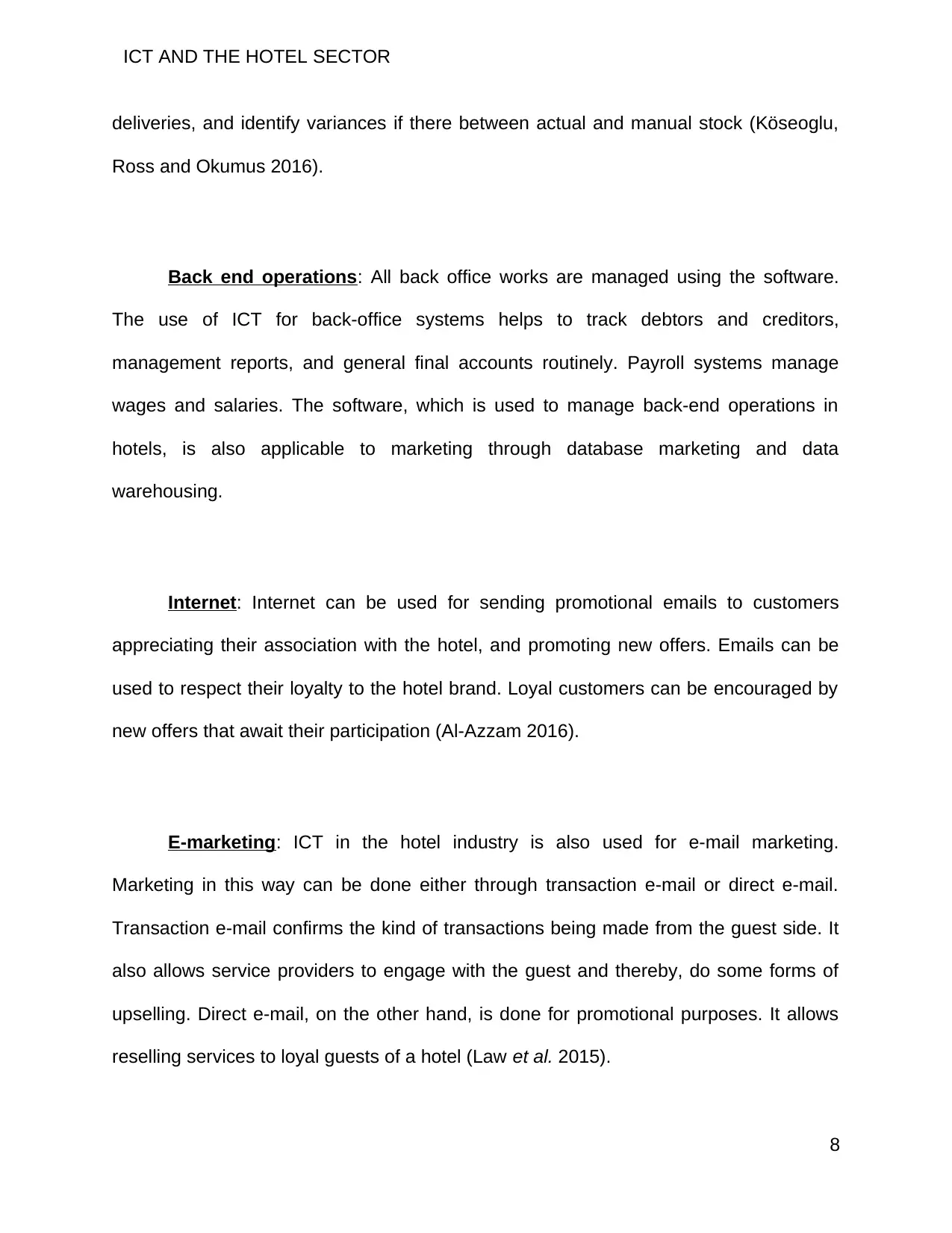
ICT AND THE HOTEL SECTOR
deliveries, and identify variances if there between actual and manual stock (Köseoglu,
Ross and Okumus 2016).
Back end operations: All back office works are managed using the software.
The use of ICT for back-office systems helps to track debtors and creditors,
management reports, and general final accounts routinely. Payroll systems manage
wages and salaries. The software, which is used to manage back-end operations in
hotels, is also applicable to marketing through database marketing and data
warehousing.
Internet: Internet can be used for sending promotional emails to customers
appreciating their association with the hotel, and promoting new offers. Emails can be
used to respect their loyalty to the hotel brand. Loyal customers can be encouraged by
new offers that await their participation (Al-Azzam 2016).
E-marketing: ICT in the hotel industry is also used for e-mail marketing.
Marketing in this way can be done either through transaction e-mail or direct e-mail.
Transaction e-mail confirms the kind of transactions being made from the guest side. It
also allows service providers to engage with the guest and thereby, do some forms of
upselling. Direct e-mail, on the other hand, is done for promotional purposes. It allows
reselling services to loyal guests of a hotel (Law et al. 2015).
8
deliveries, and identify variances if there between actual and manual stock (Köseoglu,
Ross and Okumus 2016).
Back end operations: All back office works are managed using the software.
The use of ICT for back-office systems helps to track debtors and creditors,
management reports, and general final accounts routinely. Payroll systems manage
wages and salaries. The software, which is used to manage back-end operations in
hotels, is also applicable to marketing through database marketing and data
warehousing.
Internet: Internet can be used for sending promotional emails to customers
appreciating their association with the hotel, and promoting new offers. Emails can be
used to respect their loyalty to the hotel brand. Loyal customers can be encouraged by
new offers that await their participation (Al-Azzam 2016).
E-marketing: ICT in the hotel industry is also used for e-mail marketing.
Marketing in this way can be done either through transaction e-mail or direct e-mail.
Transaction e-mail confirms the kind of transactions being made from the guest side. It
also allows service providers to engage with the guest and thereby, do some forms of
upselling. Direct e-mail, on the other hand, is done for promotional purposes. It allows
reselling services to loyal guests of a hotel (Law et al. 2015).
8
⊘ This is a preview!⊘
Do you want full access?
Subscribe today to unlock all pages.

Trusted by 1+ million students worldwide
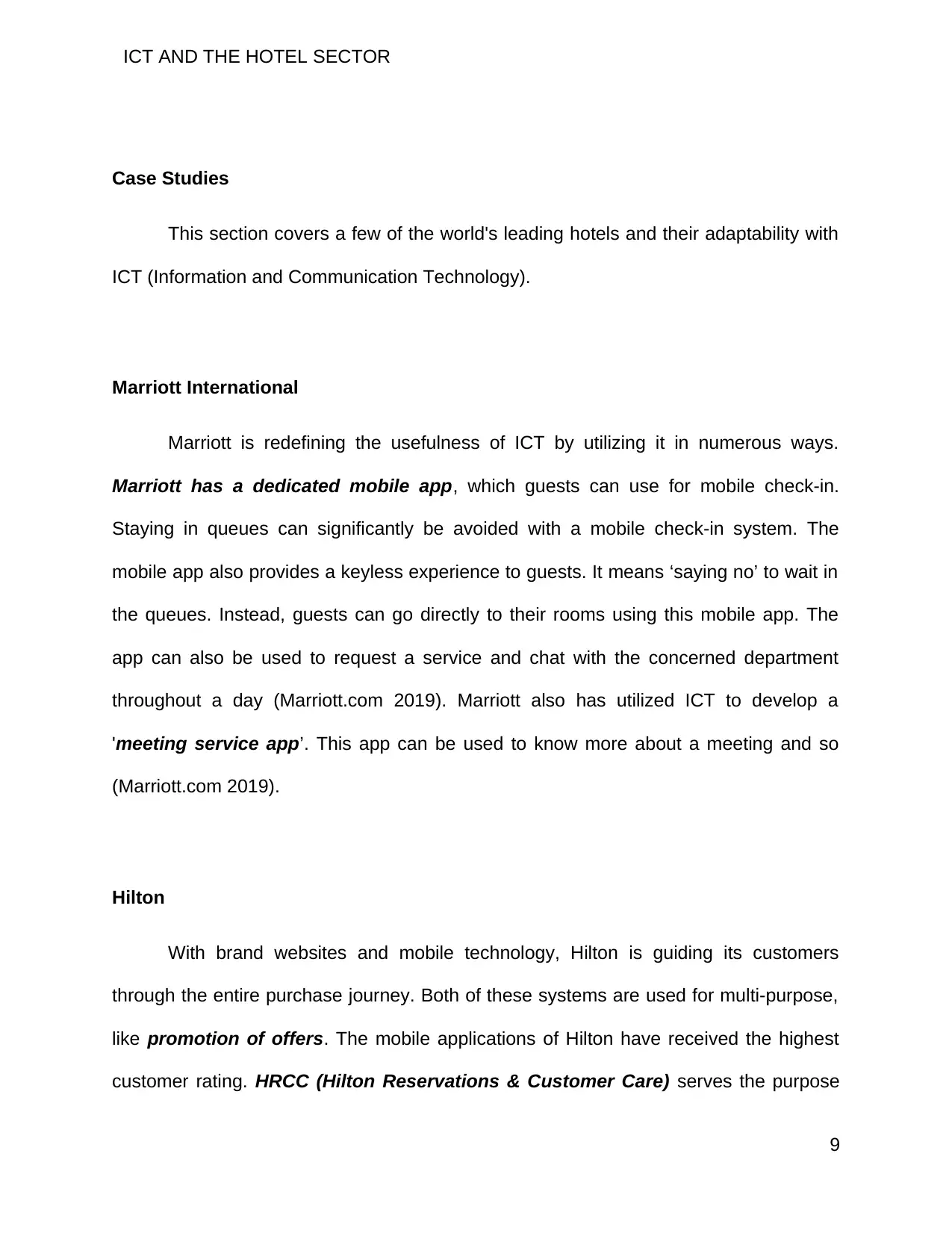
ICT AND THE HOTEL SECTOR
Case Studies
This section covers a few of the world's leading hotels and their adaptability with
ICT (Information and Communication Technology).
Marriott International
Marriott is redefining the usefulness of ICT by utilizing it in numerous ways.
Marriott has a dedicated mobile app, which guests can use for mobile check-in.
Staying in queues can significantly be avoided with a mobile check-in system. The
mobile app also provides a keyless experience to guests. It means ‘saying no’ to wait in
the queues. Instead, guests can go directly to their rooms using this mobile app. The
app can also be used to request a service and chat with the concerned department
throughout a day (Marriott.com 2019). Marriott also has utilized ICT to develop a
'meeting service app’. This app can be used to know more about a meeting and so
(Marriott.com 2019).
Hilton
With brand websites and mobile technology, Hilton is guiding its customers
through the entire purchase journey. Both of these systems are used for multi-purpose,
like promotion of offers. The mobile applications of Hilton have received the highest
customer rating. HRCC (Hilton Reservations & Customer Care) serves the purpose
9
Case Studies
This section covers a few of the world's leading hotels and their adaptability with
ICT (Information and Communication Technology).
Marriott International
Marriott is redefining the usefulness of ICT by utilizing it in numerous ways.
Marriott has a dedicated mobile app, which guests can use for mobile check-in.
Staying in queues can significantly be avoided with a mobile check-in system. The
mobile app also provides a keyless experience to guests. It means ‘saying no’ to wait in
the queues. Instead, guests can go directly to their rooms using this mobile app. The
app can also be used to request a service and chat with the concerned department
throughout a day (Marriott.com 2019). Marriott also has utilized ICT to develop a
'meeting service app’. This app can be used to know more about a meeting and so
(Marriott.com 2019).
Hilton
With brand websites and mobile technology, Hilton is guiding its customers
through the entire purchase journey. Both of these systems are used for multi-purpose,
like promotion of offers. The mobile applications of Hilton have received the highest
customer rating. HRCC (Hilton Reservations & Customer Care) serves the purpose
9
Paraphrase This Document
Need a fresh take? Get an instant paraphrase of this document with our AI Paraphraser
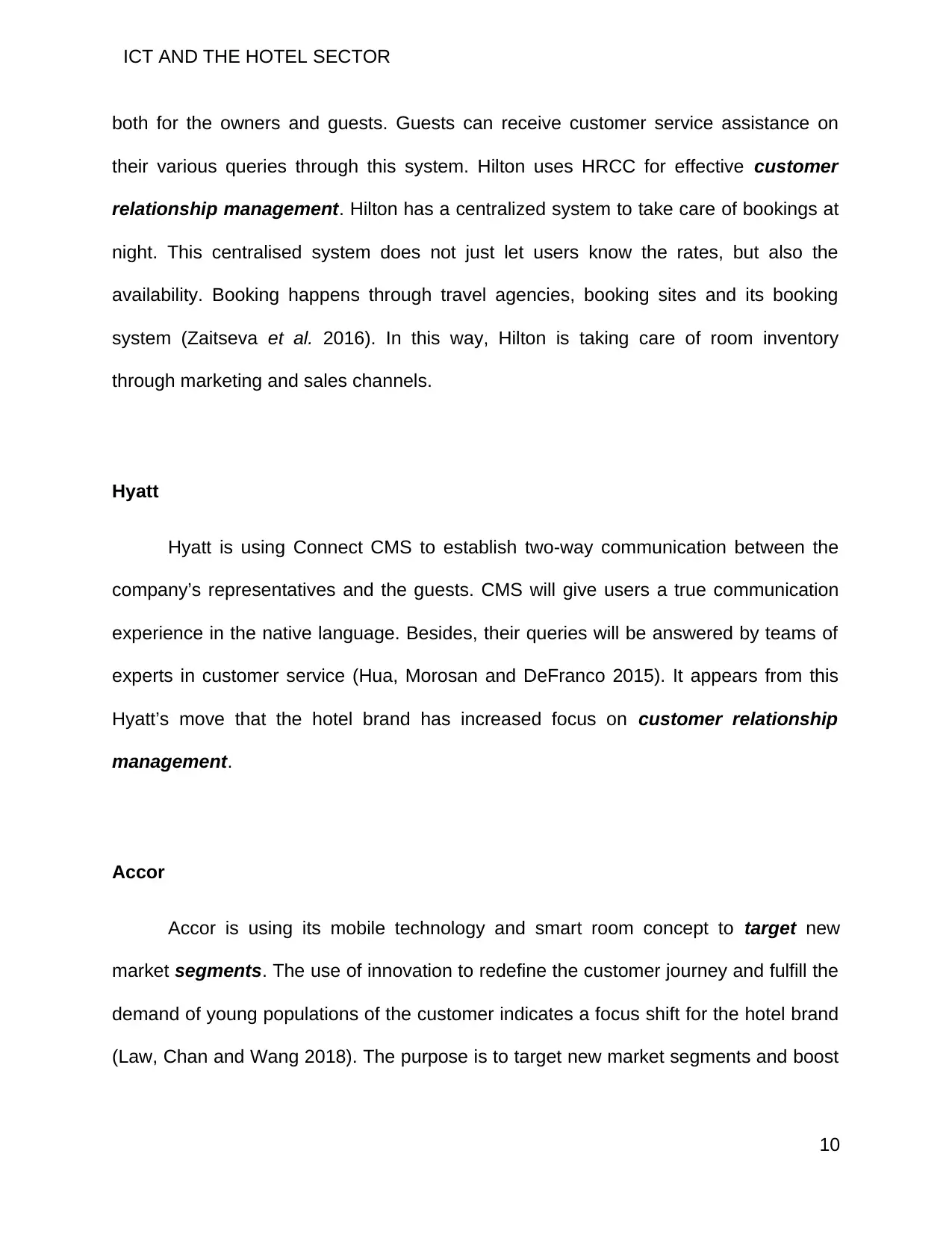
ICT AND THE HOTEL SECTOR
both for the owners and guests. Guests can receive customer service assistance on
their various queries through this system. Hilton uses HRCC for effective customer
relationship management. Hilton has a centralized system to take care of bookings at
night. This centralised system does not just let users know the rates, but also the
availability. Booking happens through travel agencies, booking sites and its booking
system (Zaitseva et al. 2016). In this way, Hilton is taking care of room inventory
through marketing and sales channels.
Hyatt
Hyatt is using Connect CMS to establish two-way communication between the
company’s representatives and the guests. CMS will give users a true communication
experience in the native language. Besides, their queries will be answered by teams of
experts in customer service (Hua, Morosan and DeFranco 2015). It appears from this
Hyatt’s move that the hotel brand has increased focus on customer relationship
management.
Accor
Accor is using its mobile technology and smart room concept to target new
market segments. The use of innovation to redefine the customer journey and fulfill the
demand of young populations of the customer indicates a focus shift for the hotel brand
(Law, Chan and Wang 2018). The purpose is to target new market segments and boost
10
both for the owners and guests. Guests can receive customer service assistance on
their various queries through this system. Hilton uses HRCC for effective customer
relationship management. Hilton has a centralized system to take care of bookings at
night. This centralised system does not just let users know the rates, but also the
availability. Booking happens through travel agencies, booking sites and its booking
system (Zaitseva et al. 2016). In this way, Hilton is taking care of room inventory
through marketing and sales channels.
Hyatt
Hyatt is using Connect CMS to establish two-way communication between the
company’s representatives and the guests. CMS will give users a true communication
experience in the native language. Besides, their queries will be answered by teams of
experts in customer service (Hua, Morosan and DeFranco 2015). It appears from this
Hyatt’s move that the hotel brand has increased focus on customer relationship
management.
Accor
Accor is using its mobile technology and smart room concept to target new
market segments. The use of innovation to redefine the customer journey and fulfill the
demand of young populations of the customer indicates a focus shift for the hotel brand
(Law, Chan and Wang 2018). The purpose is to target new market segments and boost
10
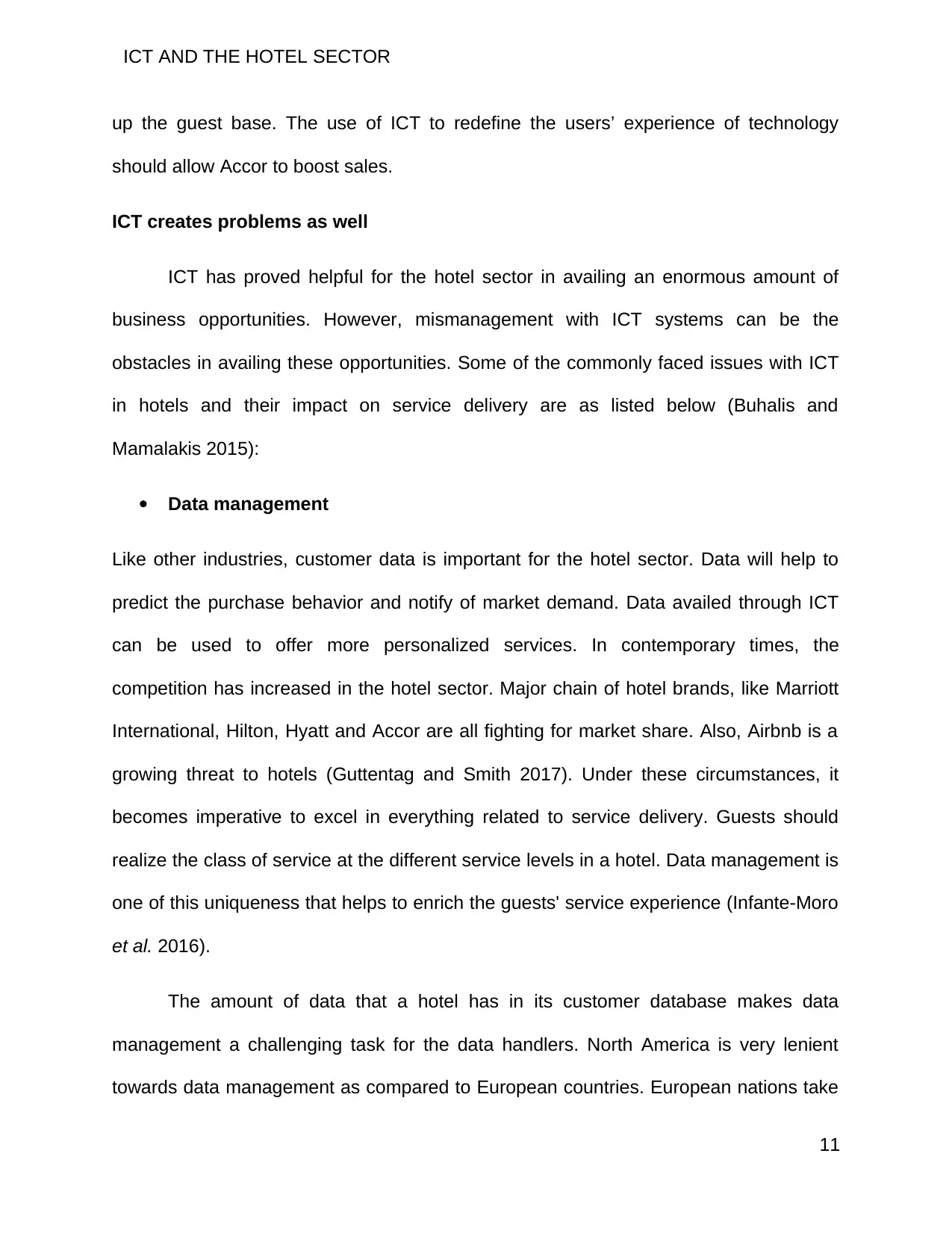
ICT AND THE HOTEL SECTOR
up the guest base. The use of ICT to redefine the users’ experience of technology
should allow Accor to boost sales.
ICT creates problems as well
ICT has proved helpful for the hotel sector in availing an enormous amount of
business opportunities. However, mismanagement with ICT systems can be the
obstacles in availing these opportunities. Some of the commonly faced issues with ICT
in hotels and their impact on service delivery are as listed below (Buhalis and
Mamalakis 2015):
Data management
Like other industries, customer data is important for the hotel sector. Data will help to
predict the purchase behavior and notify of market demand. Data availed through ICT
can be used to offer more personalized services. In contemporary times, the
competition has increased in the hotel sector. Major chain of hotel brands, like Marriott
International, Hilton, Hyatt and Accor are all fighting for market share. Also, Airbnb is a
growing threat to hotels (Guttentag and Smith 2017). Under these circumstances, it
becomes imperative to excel in everything related to service delivery. Guests should
realize the class of service at the different service levels in a hotel. Data management is
one of this uniqueness that helps to enrich the guests' service experience (Infante-Moro
et al. 2016).
The amount of data that a hotel has in its customer database makes data
management a challenging task for the data handlers. North America is very lenient
towards data management as compared to European countries. European nations take
11
up the guest base. The use of ICT to redefine the users’ experience of technology
should allow Accor to boost sales.
ICT creates problems as well
ICT has proved helpful for the hotel sector in availing an enormous amount of
business opportunities. However, mismanagement with ICT systems can be the
obstacles in availing these opportunities. Some of the commonly faced issues with ICT
in hotels and their impact on service delivery are as listed below (Buhalis and
Mamalakis 2015):
Data management
Like other industries, customer data is important for the hotel sector. Data will help to
predict the purchase behavior and notify of market demand. Data availed through ICT
can be used to offer more personalized services. In contemporary times, the
competition has increased in the hotel sector. Major chain of hotel brands, like Marriott
International, Hilton, Hyatt and Accor are all fighting for market share. Also, Airbnb is a
growing threat to hotels (Guttentag and Smith 2017). Under these circumstances, it
becomes imperative to excel in everything related to service delivery. Guests should
realize the class of service at the different service levels in a hotel. Data management is
one of this uniqueness that helps to enrich the guests' service experience (Infante-Moro
et al. 2016).
The amount of data that a hotel has in its customer database makes data
management a challenging task for the data handlers. North America is very lenient
towards data management as compared to European countries. European nations take
11
⊘ This is a preview!⊘
Do you want full access?
Subscribe today to unlock all pages.

Trusted by 1+ million students worldwide
1 out of 20
Related Documents
Your All-in-One AI-Powered Toolkit for Academic Success.
+13062052269
info@desklib.com
Available 24*7 on WhatsApp / Email
![[object Object]](/_next/static/media/star-bottom.7253800d.svg)
Unlock your academic potential
Copyright © 2020–2026 A2Z Services. All Rights Reserved. Developed and managed by ZUCOL.


![Managing Accommodation Services: LO1 Report, [University Name]](/_next/image/?url=https%3A%2F%2Fdesklib.com%2Fmedia%2Fimages%2Fnk%2F5305ca6f8ca5407baa9107a72849f4c6.jpg&w=256&q=75)
